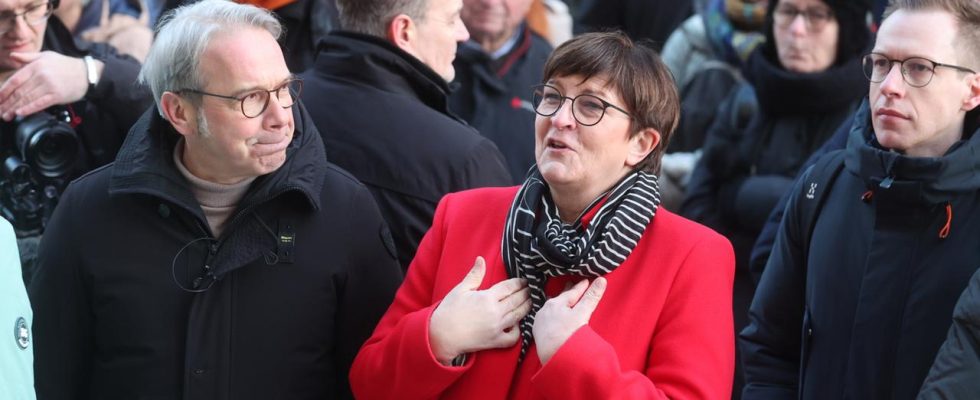Hundreds of thousands of people are protesting against right-wing extremism and the AfD – including politicians. But what can the parties learn from the demonstrators?
“You just don’t feel so alone anymore,” says Birgit Kieschnick from Bautzen. So many are on the streets: “This is really great.” Kieschnick is one of those who has been warning for years. In front of the AfD or in front of people who spread conspiracy stories. But in all these years, she says, she felt that politics did not take her seriously. This led to a climate in which people wanted to leave the city out of fear. But “the fact that the first demonstration took place here gave many people a lot of strength. And it also gives many people hope.”
If you ask Kieschnick what politicians should learn from this, she has a clear message: All democratic parties should pull together now. “Don’t always blink on the right and talk to the AfDers, but rather uphold human dignity and empathy and look for solutions and finally make electable politics.”
1,500 people demonstrated in Bautzen at the end of January. Taking to the streets against AfD and right-wing extremism in the east of Saxony is different than in Berlin. Here there are a hundred times as many. And including many politicians. They post photos on social media and like to show themselves.
Green Party co-leader Ricarda Lang, SPD co-chair Esken – they are all in the middle of it all in front of the Bundestag. Federal Health Minister Karl Lauterbach sent several selfies and said into the camera: “This is not a party event here today.”
“Democracy needs democrats”
Not a party event. But what does politics do when hundreds of thousands demonstrate for democracy? Green politician Lang sees above all a task for the traffic light coalition to argue less publicly and to solve people’s problems in everyday life together. “We notice that where fears can be mobilized, a breeding ground for hate is created and this hate in turn serves those who have nothing to offer other than hatred and misanthropy.”
Her SPD colleague Esken calls for those who demonstrate to be strengthened. “Democracy needs democrats,” says the party leader. She talks about the Democracy Promotion Act, which has been discussed for years. That means: In times of tight budgets, money for those who fight for democracy.
The Union’s former candidate for chancellor, Armin Laschet, speaks of an encouraging signal. He knows people who have never demonstrated before – but are now on the streets. The CDU politician himself is on stage in Aachen. The short speech is celebrated on social media.
Laschet talks about 1933 and how the NSDAP abolished democracy in just two months. “And that’s why anti-democrats must not be allowed to hold any state positions. They will use them to eliminate democracy and we will not allow that.”
“Why shouldn’t the Union join in?”
In addition to Laschet, politicians from other parties are also demonstrating. The fact that some at the demos don’t want the Union there – even lumping it in with the AfD – doesn’t deter him.
“Why shouldn’t the Union join in?” he asks. It is the strongest party and the only bastion against the AfD in the East. “These are attempts, I think they’re rather small-minded, and a democratic party shouldn’t be deterred by that. I think it’s good that everyone is involved, that the SPD is also taking part, the Greens are taking part, the FDP is taking part.”
In the end, as Armin Laschet says, what matters is that many people vote. “The demonstration alone is not a vote in the ballot box. You can only cast it on election day.”
Birgit Kieschnick from Bautzen would like politics to take her more seriously. And hopes that the demonstrations will continue for a long time. Everyone has to stick with it. “This must not go to waste, it must continue. And it must continue visibly.”
Hundreds of thousands every weekend. It probably won’t continue like this. Nobody knows yet what comes next. Neither the demonstrators nor the parties in Berlin.

